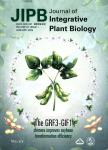Nitric Oxide Regulates Dark-Induced Leaf Senescence Through EIN2 in Arabidopsis
Nitric Oxide Regulates Dark-Induced Leaf Senescence Through EIN2 in Arabidopsis作者机构:The National Key Laboratory of Plant Molecular Genetics and National Center for Plant Gene Research(Shanghai)Institute of Plant Physiology&EcologyShanghai Institutes for Biological Sciencesthe Chinese Academy of SciencesShanghai 200032China
出 版 物:《Journal of Integrative Plant Biology》 (植物学报(英文版))
年 卷 期:2012年第54卷第8期
页 面:516-525页
核心收录:
学科分类:081704[工学-应用化学] 07[理学] 08[工学] 0817[工学-化学工程与技术] 09[农学] 0901[农学-作物学] 0703[理学-化学] 070301[理学-无机化学]
基 金:supported by the National Natural Science Foundation of China (31170244 and 30770198)
主 题:Arabidopsis dark EIN2 leaf senescence nitric oxide.
摘 要:The nitric oxide (NO)-deficient mutant nosllnoal exhibited an early leaf senescence phenotype. ETHY- LENE INSENSITIVE 2 (EIN2) was previously reported to function as a positive regulator of ethylene- induced senescence. The aim of this study was to address the question of how NO interacts with ethylene to regulate leaf senescence by characterizing the double mutant ein2-1 nosllnoal (Arabidopsis thaliana). Double mutant analysis revealed that the nosllnoal-mediated, dark-induced early senescence phenotype was suppressed by mutations in EIN2, suggesting that EIN2 is involved in nitric oxide signaling in the regulation of leaf senescence. The results showed that chlorophyll degradation in the double mutant leaves was significantly delayed. In addition, nosllnoal-mediated impairment in photochemical efficiency and integrity of thylakoid membranes was reverted by EIN2 mutations. The rapid upregulation of the known senescence marker genes in the nosl/noal mutant was severely inhibited in the double mutant during leaf senescence. Interestingly, the response of dark-grown nosl/noal mutant seedlings to ethylene was similar to that of wild type seedlings. Taken together, our findings suggest that EIN2 is involved in the regulation of early leaf senescence caused by NO deficiency, but NO deficiency caused by NOSIlNOA1 mutations does not affect ethylene signaling.




